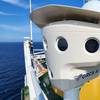The Maltese-registered tanker Erika, which sank off the French coast a year ago releasing a huge oil slick, was in a state of more or less advanced corrosion, the official disaster report said. The report, by the French marine accident investigation bureau, (BMER), said the vessel resembled a "patchwork of metal sheets of different thickness and varied quality."
"The vessel would not have fallen apart if it had been as seaworthy as it was claimed to be by classification societies as late as 20 days before it broke up on December 12, 1999, the report said. There was excessive corrosion, beyond norms that are considered acceptable by classification societies and the sub-standard welding was noted on the ship.
Erika broke in half in stormy seas, spewing up to 15,000 tons of oil onto the rocky shoreline of western France. The two sections of the ship lie on the seabed about 70 km (40 miles) offshore.
The pollution triggered an outcry and hordes of volunteers flocked to the coast for a bucket-and-spade clean up. Most beaches were largely tar-free by summer, but residual fuel remained on some rocky areas as the peak tourism season began.
Oil giant TotalFinaElf, which chartered the tanker, has since conducted a pumping operation, which recovered a further 11,235 tons of heavy fuel oil from the ship. BMER did not directly blame the firm but said it knew the vessel well, having already chartered it four times the same year.
The BMER report said maintenance of Erika was reduced and the crew suspected what a poor state the vessel really was in.
The report made a series of recommendations including that oil groups take more care when chartering vessels. It specifically recommended that French oil firms form their own fleets, given that they have the finance to do so, under French flags and answerable to stringent national regulations. It also called for more frequent inspections and repairs on existing vessels despite higher costs.
Sponsored Content
How mobile data informs safety and efficiency onboard and ashore

March 2025
 Read the Magazine
Read the Magazine

 Read the Magazine
Read the Magazine
This issue sponsored by:

Ship Design Evolution & The Mother of Monster Waves
Subscribe for
Maritime Reporter E-News
Maritime Reporter E-News is the maritime industry's largest circulation and most authoritative ENews Service, delivered to your Email five times per week










